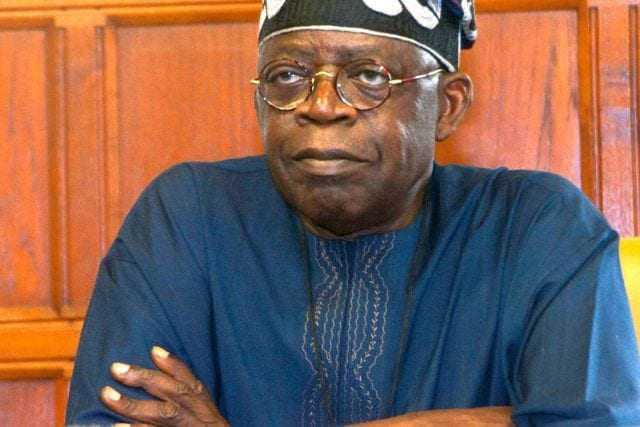The United States District Court for the District of Columbia has ordered top U.S. law enforcement agencies to release confidential information generated on President Bola Tinubu during a “purported federal investigation in the 1990s,” Premium Times reports.
An American, Aaron Greenspan, had filed a suit in June 2023 under the Freedom of Information Act (FOIA) against the Executive Office for U.S. Attorneys, Department of State, Federal Bureau of Investigation (FBI), Internal Revenue Service (IRS) Drug Enforcement Administration (DEA), and the Central Intelligence Agency (CIA).
In his complaint, Mr. Greenspan accused the law enforcement agencies of violating FOIA by failing te release, within the statutory period, “documents relating to purported federal investigations into” President Tinubu and one Abiodun Agbele.
Between 2022 and 2023, Mr. Greenspan filed 12 F requests with six different U.S. government agencies seeking information about a joint investigation conducted by the FBI, IRS, DEA, and the U.S. Attorney’s Offices for the Northern Districts of Ind and Illinois.
According to Mr. Greenspan, the requested records involve charging decisions on the activities, including money laundering, of a Chicago heroin ring that operated in the early 1990s. Each FOIA request sought criminal investigative records about four individuals “allegedly associated with the drug ring: Bola Ahmed Tinubu, Lee Andrew Edwards, Mueez Abegboyega Akande, and Abiodun Agbele.”
However, the agencies issued “Glomar responses,” refusing to confirm or deny whether the requested records exist. Mr. Greenspan contested those responses at the Department of Justice’s Office of Information Policy (OIP), but the OIP affirmed the gencies’ stance.
Subsequently, Mr. Greenspan filed a lawsuit on 12 June 2023, naming the FBI, DEA, IRS, EOUSA, and department of State as defendants.Court documents show that the CIA was later added as a defendant
On 20 October 2023, Mr. Greenspan filed an emergency motion seeking a hearing to compel the agencies to immediately produce the records. He cited the Nigerian Supreme Court’s impending hearing on petitions challenging Tinubu’s election. Three days later, however, the court denied the emergency motion for failing to meet the criteria for injunctive relief.
On the same day, President Tinubu moved to intervene in the case, citing his privacy interests in his “confidential tax records” and documents from law enforcement agencies protected under the Privacy Act or FOIA exemptions.
In 1993, Mr. Tinubu reportedly forfeited $460,000 t the U.S. government after authorities linked the funds to narcotics trafficking proceeds. The issue featured prominently during
However, on Tuesday, Judge Howell ruled partly in favor of Mr. Greenspan. The judge said the ‘Glomar’ responses asserted by the FBI and DEA were “improper and must be lifted,” noting the agencies failed to show they properly invoked FOIA exemptions.
Since it was acknowledged that Mr. Tinubu was a subject of investigations involving the FBI and DEA, Judge Howell concluded that maintaining the Glomar responses “is neither logical nor plausible.”
The judge explained that FOIA requesters can challenge Glomar responses by showing either (1) that confirming or denying the existence of records would not cause cognizable harm under a FOIA exemption or (2) that the agency has officially acknowledged the exempt information…
Meanwhile, the CIA prevailed in the case, as the judge ruled that Mr. Greenspan failed to demonstrate that the agency had officially acknowledged the existence or nonexistence of responsive records. Therefore, the CIA’s Glomar response was sustained.
Five of Mr. Greenspan’s FOIA requests remain at issue in the pending cross-motions for summary judgment. During a hearing, the plaintiff agreed to narrow the issues to the agencies’ Glomar responses, redactions, and withholdings related to Mr. Tinubu and Mr. Agbele only.
The judge directed the remaining defendants, excluding the CIA, to file a joint status report on any outstanding issues by 2 May.
Documents submitted by Mr. Greenspan in support of his FOIA lawsuit included a…
The affidavit by IRS Special Agent Kevin Moss detailed the drug trafficking activities of Mr. Agbele and linked the forfeited funds to proceeds from heroin trafficking. It recounted how Mr. Agbele, while cooperating with U.S. authorities after his arrest, identified Mr. Akande, an associate of Mr. Tinubu, as his uncle and facilitator.
The affidavit further detailed how DEA investigations linked the heroin ring to various individuals, including Mr. Tinubu, and found probable cause that funds in certain bank accounts controlled by him were proceeds of drug trafficking.
The investigation reportedly relied on information provided by agents of the IRS, DEA, and FBI.



